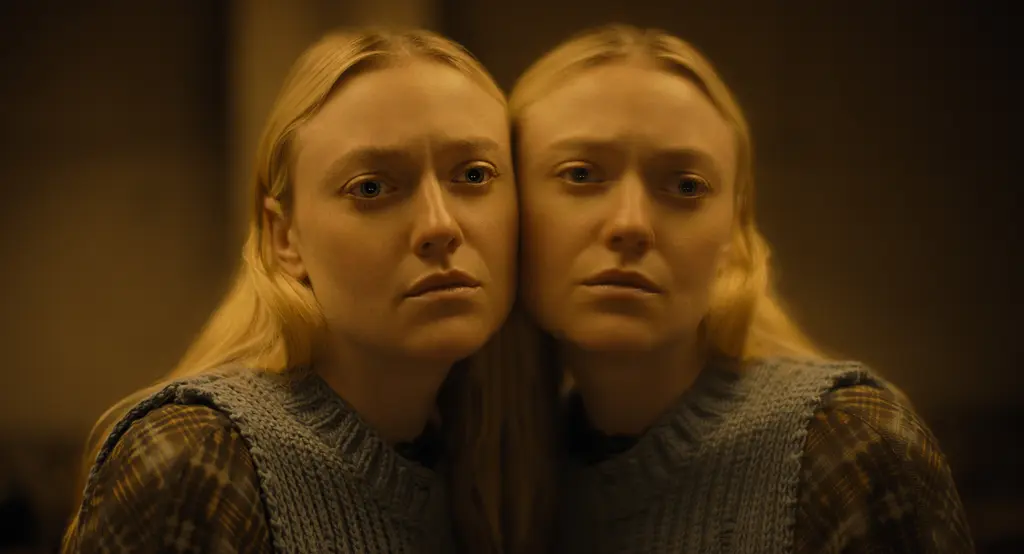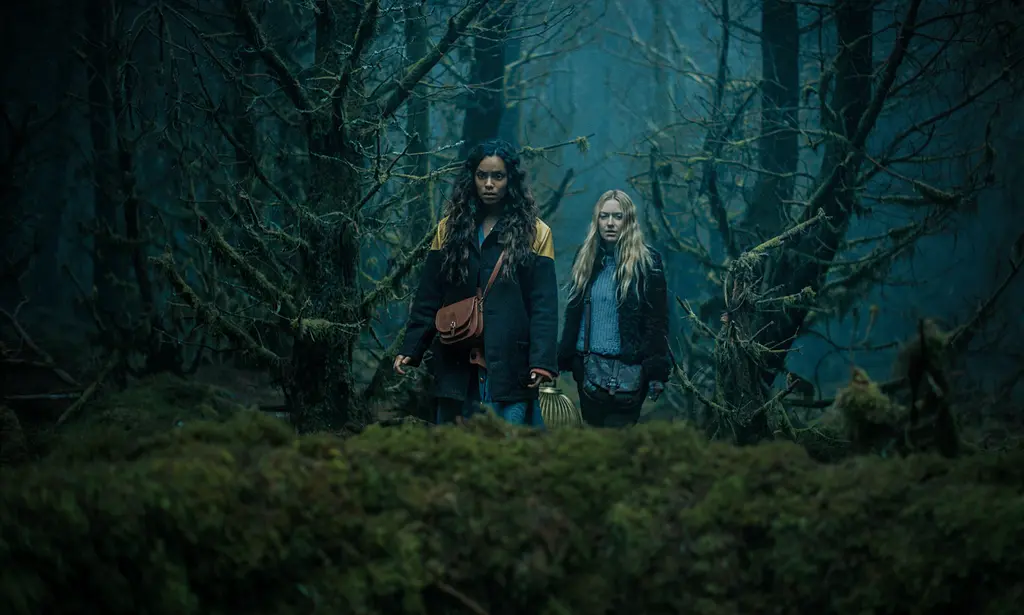Ishana Night Shyamalan: “I’m nerdy about fantasy and horror”

The Night Shyamalan family’s business is horror – and business is good. This summer, two twenty-something members of the filmmaking clan make their big-screen debuts. First up, director Ishana and her Ireland-set scary-tale The Watched…
Culture
Words: Craig McLean
If you go down to the woods today, you’re sure of a big surprise. There, amidst the dense tree cover of County Wicklow, you’ll find a 24-year-old, American, first-time filmmaker making a scarily accomplished debut feature.
The Watched – based on Irish author A.M. Shine’s 2022 novel The Watchers – is a horror movie that stars Dakota Fanning as Mina, a US transplant working in a pet shop in smalltown Ireland. Charged with delivering a parrot to a customer in Belfast, her day-long journey goes awry when the road turns into a forest track and – uh-oh – her car breaks down. With daylight fading fast and finding herself impossibly lost in the creepiest woods ever, Fanning seeks refuge, in the nick of time, with three other wayward travellers in a concrete bunker called The Coop.
The catch: none of them can leave. One wall of their bolthole is a two-way mirror, in front of which the four must parade themselves nightly. This is for the entertainment of the beings who rule the forest after dark: the watchers. And with woodland this dense, and creatures this terrifying – not to mention fast – it’ll take more than 5G and Google Maps for Mina to escape.
So, yes, some familiar genre tropes here, with any more detail being too spoiler‑y to reveal. But the success of The Watched is less surprising when you know that screenwriter and director Ishana Night Shyamalan is the middle daughter of M. Night Shyamalan, writer/director of The Sixth Sense (1999), Unbreakable (2000), Split (2016), Glass (2019) and many more modern horror/fantasy classics (and some right duffers, too. We’re looking at you, The Last Airbender). He’s a producer on The Watched.
The 24-year-old grew up at her father’s knee, and on his sets, from Lady in the Water (2006) onwards. She only graduated from NYU Tisch School of the Arts three years ago. But Ishana has already written and directed several episodes of Apple TV+’s domestic horror series Servant and shot second-unit on the features Old (2021) and Knock at the Cabin (2023) – all projects helmed by her dad. She’s also directed videos for her musician sister Saleka, the star of another imminent Shyamalan project: M. Night’s serial-killer-at-pop-concert thriller Trap, released in August.
They are, then, the close-knit Shymalans: the family that slays together, stays together.
Good to meet you, Ishana. Why did you want to adapt A.M. Shine’s book for the screen?
There’s many wonderful elements in it. I felt, as a horror lover, that this was a really fresh take on the genre. I was very scared reading it. It had all those elements that I would love to feel in a theatre setting.
You grew up in Pennsylvania, where your dad sets a lot of his films. Was there something appealing about shooting in Ireland, well out of your geographical and cultural comfort zone?
Absolutely. I enjoy the process of going to other places and immersing and learning. That was a very compelling element. And the way A.M. had written the book had such reverence for Ireland [that] it became a character in the novel. So I was very into the challenge of [whether] I could do the same thing in the film format.
I’m mindful of spoilers, so I’ll be careful of the language I use. But how did you go about visualising your “monsters”?
It was a fluid process of pulling imagery that gutturally scared me. Then going on this path of thinking: if this were to actually exist in this forest and the history that exists is the history that’s real, what possibly could that be today? So it was thinking about it scientifically: how would they be affected by these trees and this dirt? What would that do to the skin and colour palette? So, making decisions from that place of hypothetical truth.

What made Dakota Fanning your leading woman?
She’s so brilliant. A wonderful, nuanced actress. She carries so much complexity. She’s someone that, every time I see her, I want to be her. I’m like: “You’re so cool!” So putting someone like that at the centre of this movie, there is a little bit of wish fulfilment.
How gruelling was the shoot in the woods?
It was logistically crazy and unpredictable, for sure. Just by nature of shooting outside, you’re at the mercy of so many different factors – light and rain and temperature. But it was oddly a very playful environment. The Irish people are very unfazed by those elements. And American people are very, very affected!
Why do you think we’re still so scared of the woods?
Any of those immense places in nature, which I do feel are shrinking, are places where we realise how limited our humanness is. There’s an element of going into those worlds and just remembering how small and incapable you are. That’s a very humbling thing that gets you in touch with the real things that are going on. Also, there’s mystery in the trees. They carry a spiritual energy about them.
Your dad used that force to chilling effect in The Village (2004). Did you go back and look at that film when you were prepping this?
That’s such a masterful movie and really struck me when I first saw it. I didn’t go back and watch it, but I was listening to The Village score a lot when I was writing. That was one of the ways that I was connecting to that movie, to create my version of the forest but keep it in a different world.


How preordained was it that you would follow your dad not just into moviemaking, but into the fantasy-slash-horror genre?
I don’t know! As a kid and a teen, you spend your life trying to not be like your parents. Trying to do different things. I was no exception to that. I always wanted to be super-individual and pave my own path. But the truth found me at some point where this art form, and this particular genre, was the place I felt most comfortable in. It’s interesting the way those things happen. Certain things are out of our control.
Do your sisters and your mum have similar enthusiasm for fantasy-slash-horror?
I think they do. We all watched that kind of stuff growing up. I’m definitely the most nerdy about fantasy and horror. I was always deeply into those kinds of fandoms as a kid, and always interested in creating in that space. So I definitely lean the most in that direction.
I’ve not seen Trap yet. But what can we expect from Saleka’s performance?
I can’t say too much. The overall thing is it’s a very, very different movie than mine. It’s so funny that we created them at a very similar time, but they’re just completely different universes.

What was your first experience of one of your dad’s film sets?
I’ve been on them as long as I can remember. I was so lucky to have been there as a kid and experience that magic. The most visceral one I remember is being on the Lady in the Water set, which I guess struck at a crossroads, when I was starting to become a more conscious young person.
I remember feeling that it was an adventure for me. I was running around set – it was a build of this apartment complex. I was completely taken by the scope of the visuals. Every little detail was thought through – there were Cheetos in the party bowl!
Being onset with Split must have been something else: the multiple characters portrayed by James McAvoy, a breakout role for Anya Taylor-Joy…
It was pretty epic! That is two just absolutely brilliant performances. And it was really cool because Anya is older than I am, but at that time [was] a young woman in a similar headspace to where I was moving to. To see that enigmatic thing coming from her was very [powerful]. I have always loved the process of watching actors. It’s such a cool art form that I totally cannot do!
Some will think you’ve reached this advanced stage in filmmaking, at a young age, through nepotism and not through talent. What would you say to them?
Hopefully the work speaks for itself in certain ways. I have to acknowledge that privilege I have where I was born into a life where I was able to watch and observe. And there are certain social advantages when you’re pursuing the craft of a parent in the industry.
My approach is: I don’t believe anything should come easy with those privileges. It just means you have to work 10 times harder and move 10 times faster. I enjoy that experience of having something to prove. That will hopefully come through the test of time, how much I can deliver and how well I can deliver it.
But ultimately, it’s about the art itself. And the relationship of the movie to the audience. Really, all the rest of it is sort of unimportant, I think.
Do you know what you’re doing next?
I’m working on something now. Just gently started writing another idea that I’m pretty excited about. And the hope is to be writing a script this summer.
So, an original idea. Is it scary?
I… can’t say more about it yet. But it’s not a romcom!
The Watched is in cinemas from 7th June



